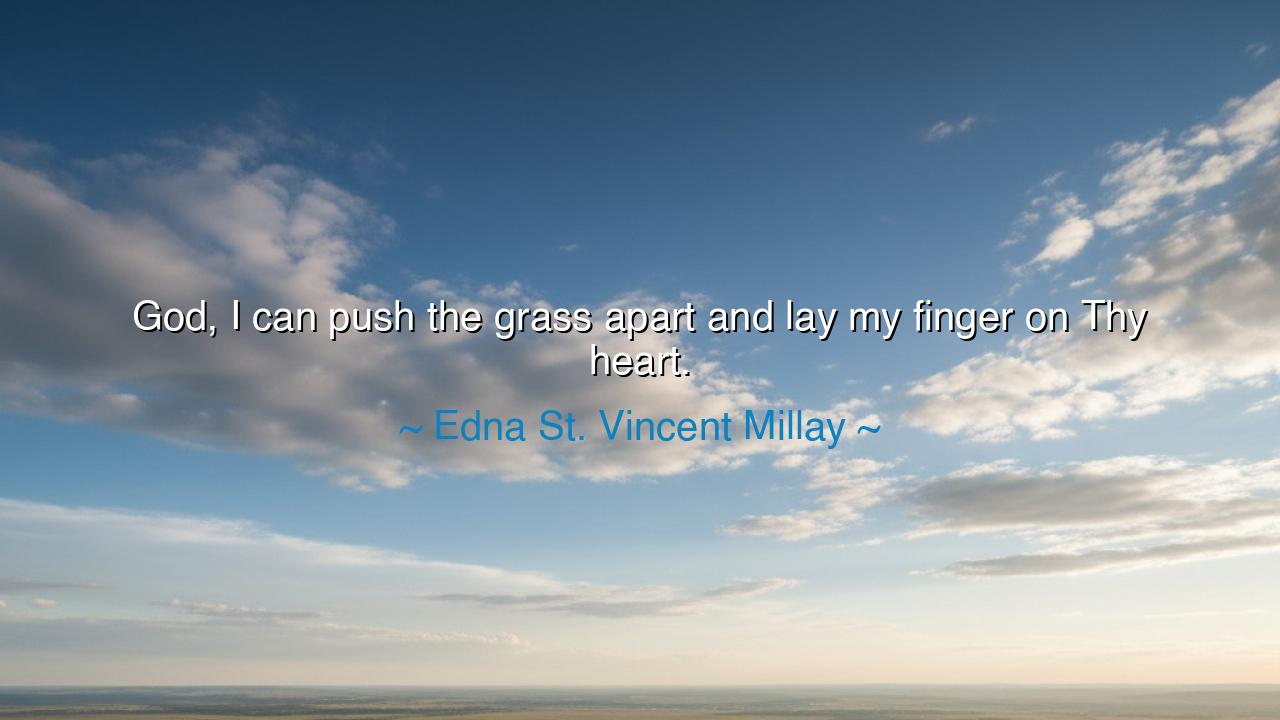
God, I can push the grass apart and lay my finger on Thy heart.






Hear, O children of wisdom, the words of Edna St. Vincent Millay, who in her poetry captured a profound truth: "God, I can push the grass apart and lay my finger on Thy heart." In these evocative words, Millay speaks of the intimate connection between God and creation—a connection so close, so tangible, that the poet feels she can touch the heart of the Divine with a simple, human gesture. To push aside the grass and lay her finger on God’s heart is to express a profound spiritual awareness: that God is not distant, not unreachable, but near, present in the earthly world around us. His heart, she suggests, is not hidden in some far-off realm, but alive in the very fabric of nature.
In the ancient world, there was a belief that the divine was not separated from the world, but rather woven into its very essence. The great philosophers and mystics of old saw the Divine as immanent, present in all things—from the smallest grain of sand to the vast stars in the sky. The Stoics, for example, believed that God’s presence was felt in the workings of nature itself, that every leaf that fluttered and every river that flowed was an expression of the Divine will. Millay echoes this deep wisdom in her words: she does not see God as an abstract concept or a far-off ruler, but as something immediate, tangible, and intimately woven into the world.
Consider the mystics of the Middle Ages, such as Saint Francis of Assisi, who spoke of the world as his "brother" and "sister." To him, the sun, the moon, the animals, and the grass were not mere elements of the natural world; they were expressions of God’s love. Francis saw God in everything—in the whisper of the wind, the scent of the flowers, and the warmth of the sun on his skin. It is through this deep connection with nature that he came to see God’s heart beating in all things. For Francis, nature was not separate from God, but an outpouring of His divine essence.
In a similar vein, Millay’s words express this same intimate relationship with the Divine, where the touch of her finger on the heart of God is not a distant, figurative notion but an experience grounded in the physical world. God’s presence is made known not only in grand theological concepts, but in the simple act of touching the grass, in the quiet moments of communion with creation. Millay evokes this connection with a sense of awe and reverence, as if through the act of connecting with nature, she connects directly with the heart of the Creator. It is through the earth beneath our feet that we touch God.
This profound understanding is further illustrated in the life of Johann Sebastian Bach, the composer whose music was a direct reflection of his deep spiritual devotion. Bach often referred to his compositions as works created "for the glory of God," believing that through music, he could touch the divine. Each note was a prayer, each melody a gesture of reverence. Through his works, Bach, like Millay, felt he could reach out to God’s heart, not in distant, abstract prayer, but in the tangible beauty of sound, the rhythmic pulse of life itself.
The lesson, O children of wisdom, is clear: God is not distant. His heart beats in the world around us, in the nature that surrounds us, in the beauty of the earth, and even in the simple act of living. We need not look to the heavens to find Him; we can find Him right here, in the world we inhabit, in the grass beneath our feet, the wind in the trees, and the warmth of the sun. To touch God’s heart is not to seek some faraway divinity, but to open ourselves to the divine presence in the everyday moments of life. Just as Millay finds God in the grass, so too can we find Him in the small, quiet moments of our lives, if only we are willing to pay attention.
What then, shall we do with this truth? We must awaken to the divine presence in all things, in the simple and the sacred, in both joy and sorrow. Every moment is a chance to touch God’s heart—whether through a quiet prayer, a moment of gratitude, or a simple connection with the world around us. We are invited to live with eyes that see the divine in the mundane, to feel God’s love not just in the abstract, but in the very fabric of creation that is ever-present, ever-waiting for us to acknowledge it. When we lay our finger on the heart of God, we are not reaching out to something distant but touching the very life force that moves through us all.
So, O children of wisdom, remember that God is not far off but near, not just in the grand and the majestic, but in the smallest moments of life, in the grass at our feet, and in the wind that whispers through the trees. Seek Him in the world around you, and in doing so, you will find that the divine is not something to be attained, but something woven into every aspect of your life. Touch God’s heart, not in moments of great triumph, but in the quiet beauty of the everyday, and you will discover that the Divine is always with you, in every season and in every breath.






AAdministratorAdministrator
Welcome, honored guests. Please leave a comment, we will respond soon